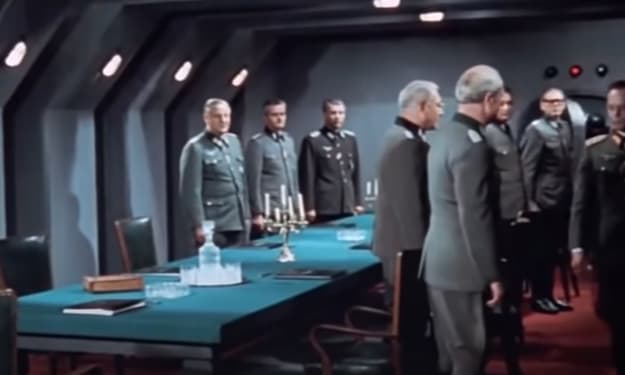Living History of Medal of Honor Recipient Desmond Doss
Combat medic

Desmond Doss was an extraordinary man whose story of bravery and unwavering faith captured the hearts of many. Born on February 7, 1919, in Lynchburg, Virginia, Desmond grew up in a humble family with strong religious values. His upbringing played a significant role in shaping his character and would later define his remarkable journey.
Desmond's life took a dramatic turn when World War II broke out. Like many young men of his generation, he felt compelled to serve his country. However, his deep-rooted beliefs as a Seventh-day Adventist presented a unique challenge - he firmly believed in the commandment "Thou shalt not kill" and refused to carry a weapon.
In 1942, Desmond enlisted in the United States Army as a conscientious objector, seeking to serve as a combat medic. Despite facing skepticism and ridicule from his fellow soldiers, Desmond remained resolute in his convictions. He was determined to save lives rather than take them.
Desmond's journey took him to Fort Jackson in South Carolina for basic training. It was here that his faith and courage were put to the test. He endured relentless harassment and discrimination from his fellow soldiers, who saw his refusal to bear arms as a sign of weakness. But Desmond never wavered, holding steadfast to his principles.
In 1944, Desmond's unit, the 307th Infantry Division, was deployed to the Pacific theater, specifically to the Battle of Okinawa. The island was a critical strategic location, fiercely defended by the Japanese. The battle was brutal and violent, with countless lives lost on both sides.
During the intense fighting, Desmond's unit found themselves at the top of the Maeda Escarpment, a sheer cliff known as Hacksaw Ridge. It was a treacherous and heavily fortified position, and the American forces faced a devastating counterattack. Under the barrage of enemy fire, soldiers were wounded and left stranded on the ridge.
Amidst the chaos, Desmond's unwavering courage shone through. Without a weapon, he single-handedly braved the onslaught, crawling through enemy fire to reach the wounded and carry them to safety. Despite sustaining injuries himself, he tirelessly rescued his comrades, lowering them down the cliff face with a makeshift rope harness.
Desmond's acts of heroism continued day and night, as he repeatedly risked his life to save others. His unwavering resolve and unyielding faith became an inspiration to his fellow soldiers, who witnessed his selflessness and determination firsthand.
In the end, Desmond Doss saved the lives of 75 men during the Battle of Okinawa, earning him the respect and admiration of his comrades. His actions defied expectations and shattered stereotypes, proving that bravery and heroism come in many forms.
Desmond's extraordinary story did not end on the battlefield. After the war, he returned home to a hero's welcome and was awarded the Medal of Honor, the highest military decoration in the United States. He became the first conscientious objector to receive this prestigious honor.
Desmond Doss's life is a testament to the power of unwavering faith, courage, and compassion. His story continues to inspire generations, reminding us of the strength of the human spirit and the capacity for selfless acts of heroism. Desmond passed away on March 23, 2006, but his legacy lives on, forever etched in the annals of history as a true American hero.
Desmond Doss's remarkable story goes beyond his acts of heroism during the Battle of Okinawa. It reveals the depth of his character and the challenges he faced throughout his life.
Growing up in a devout Seventh-day Adventist family, Desmond developed a strong sense of faith and a deep commitment to his beliefs. He was raised to value the sanctity of life and the commandment "Thou shalt not kill." This moral framework became the guiding force behind his decision to become a conscientious objector and join the Army as a non-combatant.
Desmond's journey as a conscientious objector was not an easy one. Initially, his refusal to bear arms was met with skepticism and hostility from his fellow soldiers and superiors. Many viewed him as a coward or a traitor. Yet, Desmond remained resolute and determined to serve his country in a way that aligned with his principles.
His unwavering faith and commitment to his beliefs were tested during his time at Fort Jackson. The challenges he faced went beyond ridicule and mockery. He endured beatings, extra duties, and even a court-martial. However, through it all, Desmond never wavered. He remained steadfast in his convictions and emerged from the ordeal with his integrity intact.
Desmond's courage and selflessness were on full display during the Battle of Okinawa. His actions on Hacksaw Ridge, where he single-handedly rescued 75 wounded soldiers under heavy enemy fire, were nothing short of extraordinary. He exhibited incredible endurance, crawling through mud, scaling cliffs, and braving a hail of bullets to reach the stranded men.
What made Desmond's heroism even more remarkable was his humility and compassion. He treated each wounded soldier with care and respect, providing comfort and reassurance in the midst of chaos. His fellow soldiers attested to his unwavering commitment to saving lives and his refusal to leave anyone behind.
Desmond's acts of valor did not go unnoticed. He was awarded the Medal of Honor by President Harry S. Truman on October 12, 1945. The citation for his medal emphasized his extraordinary bravery, saying that he "exhibited outstanding bravery, far above and beyond the call of duty."
After the war, Desmond faced physical and emotional challenges resulting from his experiences on the battlefield. He suffered from injuries and endured nightmares and flashbacks. However, he remained dedicated to helping others and found solace in his faith.
Desmond's story was immortalized in the 2016 film "Hacksaw Ridge," directed by Mel Gibson. The movie brought his extraordinary acts of heroism to a wider audience and further cemented his place in history as a symbol of courage and conviction.
Desmond Doss's legacy extends beyond his military service. He became an advocate for veterans' rights and post-traumatic stress disorder (PTSD) awareness. He frequently spoke at schools and churches, sharing his story and emphasizing the importance of faith, forgiveness, and nonviolence.
Desmond passed away on March 23, 2006, at the age of 87, but his impact lives on. His story continues to inspire individuals around the world, reminding us of the power of unwavering faith, compassion, and the indomitable spirit of human courage. Desmond Doss's legacy serves as a testament to the extraordinary potential within each of us to make a positive difference in the lives of others.
About the Creator
Enjoyed the story? Support the Creator.
Subscribe for free to receive all their stories in your feed. You could also pledge your support or give them a one-off tip, letting them know you appreciate their work.






Comments
There are no comments for this story
Be the first to respond and start the conversation.